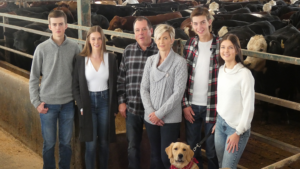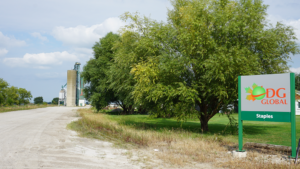Canada’s industrial biofuel strategy
ONTARIO’S CROP-BASED CLEAN FUEL POTENTIAL

ONTARIO IS HOME to bountiful and sustainable biofuel feedstocks with an established legacy and strong prospects for biofuel production. In 2022, corn and soybeans were Canada’s third and fifth largest field crops, respectively. Ontario farmers led over 60 per cent of Canada’s production of these crops, growing nearly 10 million metric tonnes of corn and four million metric tonnes of soybeans.
Ontario corn has played a significant role in first-generation Canadian biofuel production, and Ontario grain farmers have actively collaborated with industry and government to build the Ontario ethanol market. Ethanol provides critical market diversification for Ontario agriculture, giving use to downgraded crops, and it supports a circular economy, with one-third of the grain going back into animal feed as dried distiller’s grains and oils. Ontario’s six ethanol plants use local corn as a feedstock, collectively making up over a third of Ontario’s corn end-use market. However, with half of Canada’s ethanol currently being imported, a proportion of our grain currently being exported, and next-generation demand opportunities crystalizing globally, there is scope for greater onshoring of value-added biofuel production.
PROSPECTS FOR BIOFUELS IN CANADA
Grain Farmers of Ontario’s Strategic Plan has a market development objective explicitly focused on ensuring the viability of the bio-fuels and bio-products industries as a market for our grains. Over the last few years, the focus has been on Canada’s Clean Fuel Regulations, which incentivize fuel producers to purchase liquid biofuels through a crediting system to reduce emissions from the fuel supply. Grain Farmers of Ontario has worked to ensure these regulations work for farmers and create value for the sector without adding undue complexity or administration and has also advocated for Ontario’s E15 mandate, which is due to be transitioned into force by 2030.
Another policy change set for the 2030s is Canada’s proposed regulated sales target for zero-emission vehicles. This policy creates uncertainty for the ethanol sector and corn farmers.” create uncertainty for the ethanol sector and corn farmers. It also provides significant uncertainty for future consumer equity and affordability when it comes to transportation options. Grain Farmers of Ontario has encouraged the government to pursue strategies that allow for technology-agnostic decarbonization of transportation so that all potential pathways, including corn ethanol, can continue to contribute while creating value for farmers. Grain Farmers of Ontario has continuously advocated that Ontario corn ethanol is a proven, immediate, clean, affordable, and accessible biofuel that supports the decarbonization of the transport sector while ensuring energy security, affordability, and equity for Canadians.
Despite this uncertainty, there is reason to remain bullish on Ontario corn ethanol, which, despite being associated with light-duty transportation, has diverse applications. Last year, Kawartha Ethanol invested $37 million into an expansion to produce high-quality alcohol, including grain-neutral spirits, in addition to fuel ethanol. In August 2023, Greenfield Global announced a new purpose-built warehouse in the Greater Toronto Area to help them meet escalating demands for high-purity solvents and alcohols for the pharmaceutical, food and beverage, and industrial product industries In September, they completed a 30 million gallon alcohol upgrade at their Johnston distillery. And when it comes to fuel ethanol, any transition to a zero-emissions vehicle consumer fleet is going to take place over decades and is expected to include plug-in hybrids.
DRIVING FORWARD FUTURE MARKET OPPORTUNITIES
That said, Grain Farmers of Ontario is actively taking up the challenge to explore and encourage new market opportunities for Ontario corn ethanol and crop-based biofuels. Looking ahead, there is strong potential for a new generation of agriculture-based biofuels to be produced in Ontario using Ontario-grown feedstocks, particularly corn- or soy-based renewable diesel, sustainable aviation fuel (SAF), ethanol-based hydrogen fuel, and renewable natural gas. The future global demand for SAF is projected to be significant. While the production of renewable diesel and SAF from hydrotreated esters and fatty acids is today’s focus, if Ontario’s corn ethanol production is maintained, it could play a significant future role as technologies scale. As an abundant, clean, and transformation-ready product, Ontario’s corn ethanol production has potential in SAF with alcohol-to-jet technology.
As the home of Canada’s most significant existing biofuel feedstock production, ethanol processing, and biofuel consumption, Ontario should be a natural priority region for next-generation investment. However, there are challenges to be addressed in Canada’s investment ecosystem, including the capital cost to construct facilities, the ability to compete against U.S. subsidies, policy uncertainty, and the establishment of agricultural residue feedstock collection and marketing infrastructures. With this in mind, Grain Farmers of Ontario has encouraged the government to develop a Canadian biofuel strategy that considers current and future generation uses for corn ethanol, existing assets, and the significance of this market for Ontario farmers.
For market and decarbonization potential to be fully realized, the government must collaborate with Ontario grain farmers and the value chain to foster an innovation and investment ecosystem that guarantees investor confidence. This will require robust enabling policy and incentives that provide regulatory predictability and make our region and crops competitive with the U.S., which is aggressively investing in biofuel infrastructure and production, generating substantive feedstock demand opportunities stateside. It is critical that the government acts immediately and addresses within the next 10 years to realize opportunities for corn and soy agricultural residue-based renewable diesel, sustainable aviation fuel, and renewable natural gas. This is required to establish competitive project returns that ensure project commissioning and allow for project development, permitting, finance, and construction time requirements.
Grain Farmers of Ontario is also working with industry, maintaining regular engagement with all our biofuel processors. We recently supported industry efforts to secure a Bioeconomic Development Opportunity Zone rating for Sarnia-Lambton, which will support further investment into the region. This year, our Grains Innovation Fund established five strategic priority investment themes, including one focused on developing next-generation bio-economy grains-based solutions such as renewable diesel, sustainable aviation fuel and bio-based materials.
While the future market and policy landscape is never crystal clear, the potential prospects for Ontario biofuels are coming into focus. The policy, cooperation and farmer-centric strategies that led to the creation of Ontario’s ethanol industry provide an excellent roadmap for a next-generation biofuel sector in the province. Grain Farmers of Ontario will continue to track this market closely, engaging with industry and government to share that message and ensure a bright future for Ontario agriculture.
Dana Dickerson is Grain Farmers of Ontario’s manager of market development and sustainability. •


























